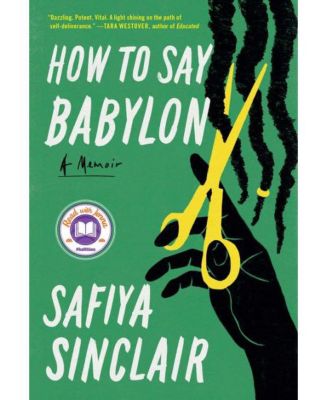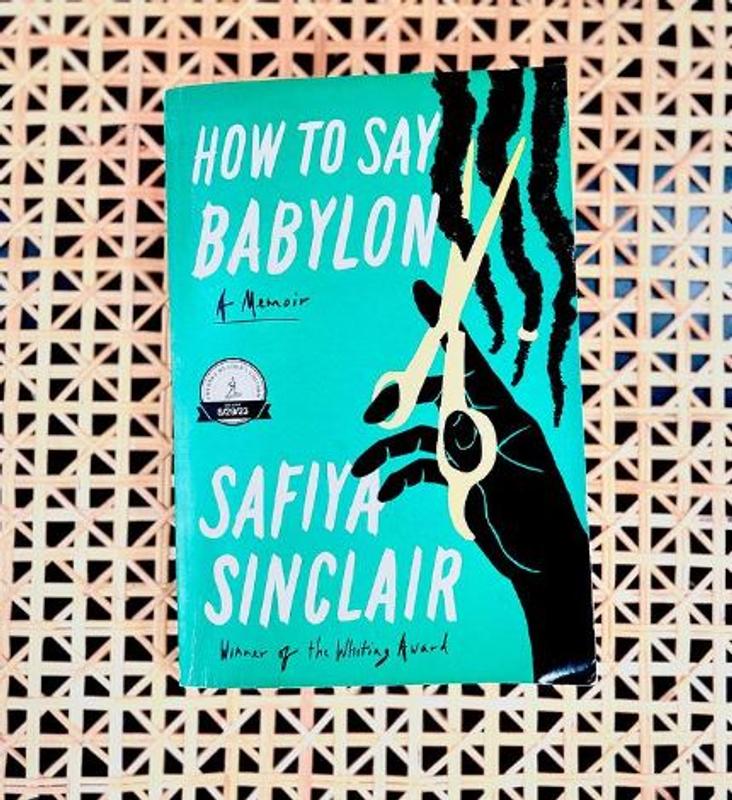How to Say Babylon- A Memoir by Safiya Sinclair
Product details
Web ID: 17341748memoir of jaimaican girl growing up rastafari
"...hurting her seemed like a way to vent my own pain. I was doing just as I hade learned from my father. But she'd seen right through my ruse and would never give me the satisfaction of seeing her wounded. All that misplaced bravado and silly strength I felt, evaporated as she turned the hurt back on me. She might as well have given me the blade. Maybe she could see me after all. Maybe she had always known. That I was not the weapon. I was only the wound." (p.192) A Jamaican girl weathers misogyny and abuse in this powerful debut memoir. Sinclair's account begins before her birth when her parents meet and find the path of Rastafari. Once told by western doctors she could never have children, Sinclair's mother births Safiya, and then her three siblings. Her father becomes increasingly religious, blaming all his misfortunes on the evils of Babylon - aka white people and those that follow their western ways. Safiya and her siblings face prejudice at school from teachers and peers who pick on them for their religion and single them out by their long dreaded hair. Their struggles carry on at home where their father's anger and rage at Babylon's injustices is targeted at his wife and children. They becomes victims of his emotional and physical abuse. Safiya and her sisters spend years living an oppressed life under their father's misogyny, which he uses his religious beliefs to justify. Eventually Sinclair finds power in her writing to step out of her father's shadow, becoming one of Jamaica's most notable poets and travelling internationally. Her poetic voice sings throughout the prose in HOW TO SAY BABYLON, leaving the reader with a sense of beauty, in a story often filled with frustration and despair. Her coming-of-age story was hard earned and will be moving for readers everywhere. I highly recommend this for fans of both literary and popular reading.
Recommends this product

Customer review from barnesandnoble.com
Beautiful language tout ph so tedious
I’m 80% through this book and likely won’t finish it. I have grown weary of how tedious the story has become. Though written beautifully, the author rewrites the same themes over and over and over and over. She begins by hinting at how she needs to get out from under her father’s influence and while writing a beautiful picture of how challenging her childhood was, she over and over discovers herself, goes back to her father, feels her life force recedes, discovers her independence and repeats it all over again. This book could have been brilliant had it been 80-100 pages shorter.

Customer review from barnesandnoble.com
Breaking free from a Rastafarian background
The Rastafarian movement aspired to free black people to take pride in being themselves in an petulant world. Unfortunately, as Safiya Sinclair here portrays, those ideals themselves sometimes led to oppressive circumstances, especially towards women and towards the curious-at-heart. She grew up in Jamaica to a musician-father who tried to seclude his family from the rest of the world (termed “Babylon”). He pressed education, but the determination and exposures Sinclair learned in school pushed her to fight against his patriarchal structures. She did so in earnest, and this eventually led her to study and work in the United States (termed “Foreign”). It also led her to break with the strictures of her upbringing, though this remains a part of her. As an adult, Sinclair is an acclaimed, well-awarded poet, and that love for images and expression carries through in this book. She evoked deep emotional responses from me while I read this book, especially around themes of patriarchal control. The middle of the book can be depressing with ubiquitous hardships, but in the conclusion, she teaches us how to heal. Though always eloquent, I didn’t find in my reading that this book was any good – until the end. And that’s just how great books are. Indeed, though about the Rastafarian religion, her insights transcend this one group and pierce deeply into the human condition. We are all born with fathers and mothers. They shape us. They mold us… even when we don’t like it. In this memoir, Sinclair teaches us what it means to truly be ourselves. Her peace with herself despite an utterly hostile world shows us how to find our peace with ourselves when we reach safety. Warning: This book does contain abuse, emotional violence, and physical violence. It certainly triggered many memories buried in me. I’m not sure any reader can work through this narrative unmoved. Therein lies its power. By plumbing the depths of how our experiences molded us, they show us afresh what it means to be human and what our human hearts truly speak. Sinclair transforms us all from being the abused, perhaps on the way towards abusing others, into exquisite poets. That sense of healing and personal confidence is why you should read this book and continue through these hard words.
Recommends this product

Customer review from barnesandnoble.com
Rastafari explained
How to Say Babylon by Safiya Sinclair I wanted to like this book, which I received from the publisher, more than I did. The author’s writing is beautiful in places and just too long in others. My main displeasure was the continual abuse the Rastafari father dishes out to the family throughout the story. There should be a disclaimer. Safiya talks about leaving the family the entire book, yet when she has the chance to stay away, she goes back for more of the escalating mistreatment from a volatile man. That amount of emotional, physical and mental abuse is abominable. Her reaction is Stockholm Syndrome on steroids. She constantly seeks his approval, which she will never get. Safiya’s accomplishments are extremely admirable and I enjoyed reading all that she overcame solely with her determination. I learned much about Rastafari and dreadlocks. On the other hand, I learned a lot about control and hypocrisy from her father. I rate this 3 stars and suggest it for those who like memoirs where you will cheer for the underdog and learn about different cultures and customs.

Customer review from barnesandnoble.com


